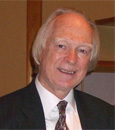
Denis Noble
Tuesday, 28 February 2012 at 18:00 in the Print Media Academy Kurfürstenanlage 52-60, Heidelberg
Mit freundlicher Unterstützung der Manfred Lautenschläger Stiftung
Denis Noble, University of Oxford
The Music of Life: The Principles of Systems Biology
Abstract
The Music of Life reinterprets many of the central facts of biology in a radically different way. Genes are viewed as co-operating in the systems of the body, with the genome viewed as an ‘organ of the cell’, to echo the phrase of the Nobel-prize winner, Barbara McClintock. Cells in turn co-operate to produce the tissues and organs of the body. There is no privileged level of causation. Downward causation occurs between all levels. These re-interpretations of biology have major implications for society. Mind-body relations are easier to understand. There are no ‘selfish’ genes. Our theories of evolution are themselves evolving.
Biography
Denis Noble is a physiologist and systems biologist who discovered electrical mechanisms in the proteins and cells that generate the rhythm of the heart. He constructed the first mathematical model of this process in Nature in 1960. Today, this work has grown into an international project, the Physiome Project, that constructs models of all the organs of the body. He is President of the International Union of Physiological Sciences and is Professor Emeritus at Oxford University. His book, The Music of Life, is the first popular science book on the principles of Systems Biology and has been translated into many languages.